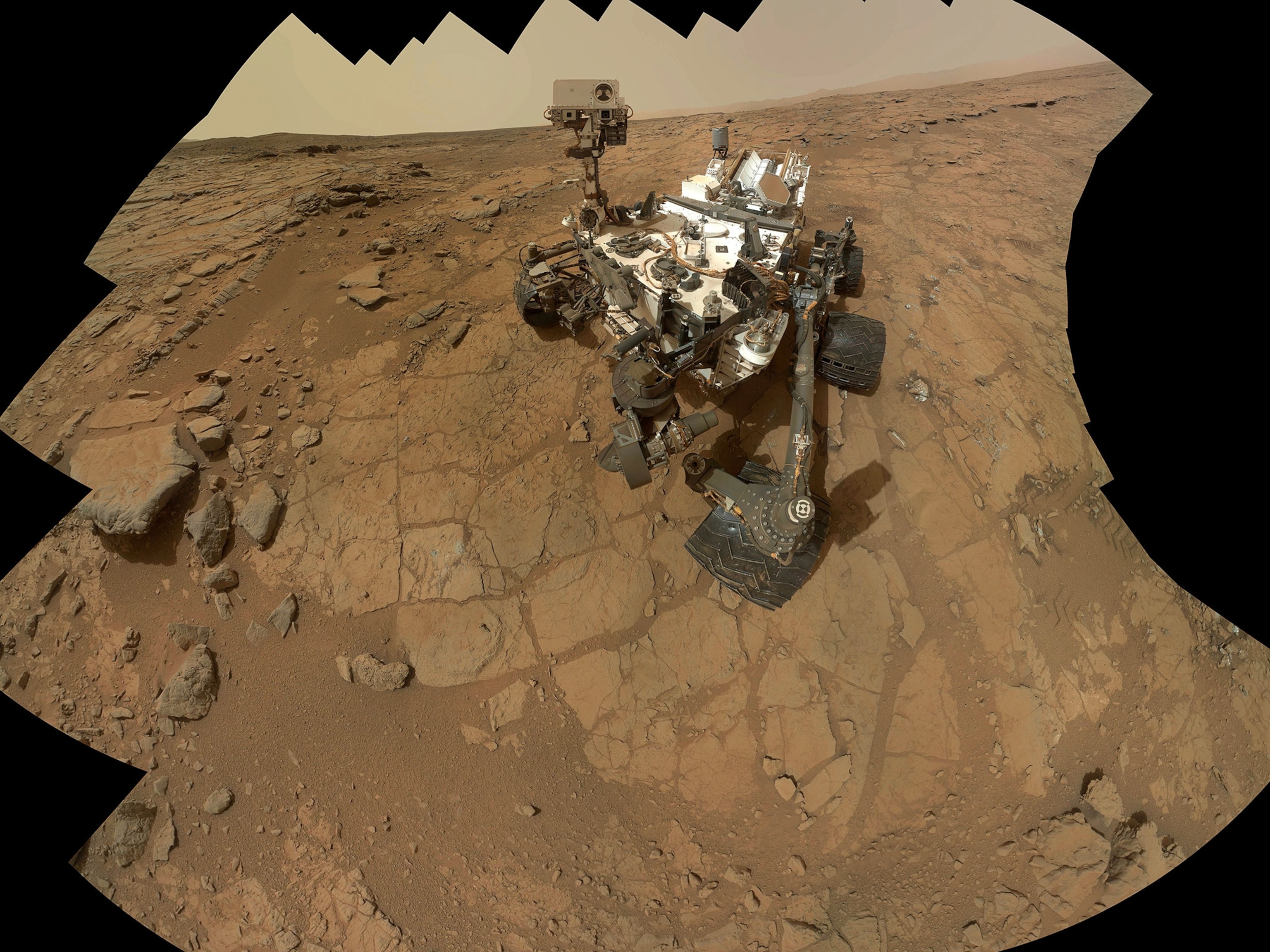
How Would We React to Finding Aliens?
Perhaps not the way you’d expect …
We’ve all seen them: Scenes depicting chaos, panic, and hysteria following the detection of alien life. Buildings crumble, fires rage, riots break out, societies collapse. If that’s how Earthlings are going to deal with the news that there’s life beyond on Earth, why risk looking for it?
Well, maybe it won’t be so bad after all. When humans do find evidence of alien life, “we will take it rather well,” according to recent results presented today at the American Association for the Advancement of Science annual meeting in Austin, Texas.
“Of course, I would also predict that if a hostile armada showed up near Jupiter, we wouldn’t be happy,” study author Michael Varnum of Arizona State University said today during a press briefing at the AAAS meeting.
Looking at a mix of news headlines and survey responses, Varnum and his colleagues found that people’s reactions to detections of alien life, both hypothetically and to the famously false announcement of microbial fossils from Mars, are generally quite positive.
“To be honest, I wasn't at all sure what we would find,” Varnum tells National Geographic. “It is worth noting that in fiction, often the discovery of extraterrestrial life is portrayed as having negative societal or psychological consequences.”
But others are skeptical that the results, published in Frontiers in Psychology, fully reflect reality, citing its overall focus on microbial life as well as a non-representative pool of respondents.
“I think the fact that the (slim) majority of folks seem ‘down’ with the idea of microbes on Mars or elsewhere is hardly surprising,” says Seth Shostak of the SETI Institute. “Grey guys are quite different, and the really interesting studies are those that try to gauge the reaction to a SETI detection, or even more dramatic, discovery of alien hardware.”
Rejoice, or Riot?
Varnum and his colleagues started by running a variety of relevant news stories through a language-analysis program and asking whether the words in those stories reflected emotions that were more positive (e.g., “happy,” “nice,” “good”) or more negative (e.g., “worried,” “nervous,” “annoyed”).
The stories the team chose covered the 1967 discovery of pulsars, strange dead stars that were initially hypothesized to be signals from intelligent extraterrestrials; the famous Wow! signal detected by SETI researchers in 1977; the 1996 “discovery” of fossilized microbes in the Martian meteorite ALH 84001; the strange behavior of Tabby’s star, which in 2015 was suggested to be the work of orbiting alien megastructures (now we know it’s just dust); and the 2017 discovery of multiple Earth-size exoplanets in the habitable zone of a star.
In these cases, the words used were more positive than negative, the team says, no matter whether the subject was microbial or technological alien life. Additional work also being presented at the AAAS meeting looked at news stories reporting that the interstellar asteroid Oumuamua could be an alien spaceship—and the findings are the same.
Next, the team asked Amazon Mechanical Turk users to predict their own reactions to the discovery of microbial alien life, and then offer an opinion on whether their response would be roughly in line with humanity’s in general. More than 500 respondents wrote down their anticipated reactions, which were analyzed in the same way as the news stories.
“I would be so interested in this. I would find all the info online I could find. I would keep up with it until I saw pictures of the life. Then, I'd probably lose interest," one person wrote.
As before, the respondents used more words indicating positive emotions, both for themselves and for humanity as a whole.
Lastly, the team asked a different set of approximately 500 Amazon Mechanical Turk users to read two stories in The New York Times and write down their reactions. One group read a story announcing the (now known to be wrong) 1996 finding of fossilized Martian microbes in a meteorite recovered from Antarctica, and the other read a 2010 story described the creation of synthetic life forms on Earth. As before, their responses were scored for positive or negative words, and as before, the responses were more positive than negative -- especially when it came to the alien microbes.
Again, Shostak isn’t particularly surprised. He notes that, for a few hectic days, it really seemed like Martian aliens had been found in 1996.
“Nobody rioted in the street, despite the fact that these were aliens a mere 35 million miles from downtown Peoria,” he says. “I think it was because, Andromeda Strain aside, most folks don’t regard microscopic extraterrestrials as either threatening or enlightening.”
That’s probably especially true when those microbes are already way dead.
Varnum and his colleagues say their results suggest that reactions to technological aliens are likely to be similarly positive. The work comes at a crucial time in astrobiological research, says psychologist Doug Vakoch, who works on crafting interstellar communiques with the Messaging Extraterrestrial Intelligence project, or METI.
“With each passing month, we learn about more exoplanets around other stars, many of them potentially habitable. The routine announcements of the discovery of yet more exoplanets circling other stars has made it seem all the more plausible that life could be distributed throughout the universe,” he says. “To learn that life has been found on Mars would be no big revelation in the minds of many people.”
Hitting Limits
But not everyone agrees that the study’s results can be generalized. For one thing, Vakoch and others say, there are light-years of difference between acknowledging the presence of otherwise harmless microbes on the next planet over and being confronted with an advanced, technological alien race. Extrapolating from one scenario to the other isn’t necessarily going to be accurate.
As well, reactions to living aliens, whether microbial or not, are likely to be quite different than reactions to fossils, which is the scenario the authors probed with stories about the Martian meteorite.
Anthropologist Kathryn Denning of York University is also concerned that the Mechanical Turk users—the majority of whom, as the study identifies, are white, college-educated Americans—aren’t even close to representative of humanity as a whole.
“The leap involved in generalizing from this pretty specific sample to a broader human reaction is really problematic,” she says. “Another limitation of the study is that the American respondents were probably assuming that the discoveries were from American sources. It is easy to imagine that it would be a more complex scenario across borders.”
(The authors say they hope to replicate the work cross-culturally for this exact reason, and Vakoch notes that there’s already a bit of work in this area that looks at the differences in American and Chinese attitudes toward a first-contact situation.)
Denning also has concerns about categorizing the words used in news stories as simply “positive” or “negative” and using those results to infer any sort of complexity.
“I'd suggest that the really juicy stuff lies in the nuances, not in the overall average,” she says.
And in the event of a detection, the way news influences opinions will be vastly more complicated than one person simply reading a news story and logging their reaction. Conversations, social media, conflicting news stories—“this is enormously important,” she says, “and it points to the need for additional research about post-detection problems, research which digs into those nuances of 'how news moves.’ It's hard to study.”
To help approach those questions, Vakoch points to the work of Ted Peters, a theologian who has explored how finding life beyond Earth would affect religious beliefs. His work suggested that people who were confident in their own religious beliefs could make room for the existence of ET—meaning, Vakoch says, that even something as thorny and seemingly at odds with science as religion can survive an alien assault.
“People will be able to accommodate even high-impact scientific discoveries without their worldviews collapsing,” he says.
And if that’s true, then maybe the study’s conclusions aren’t so far-reaching after all.
Victoria Jaggard contributed reporting from Austin.



































